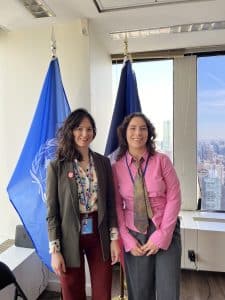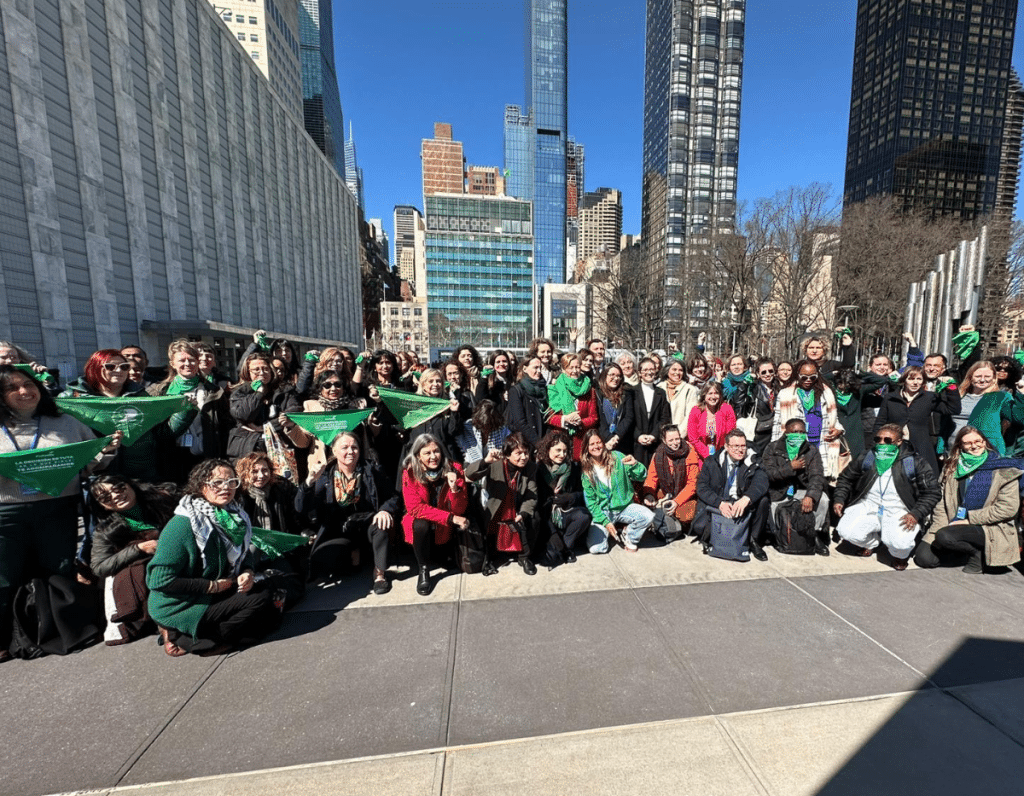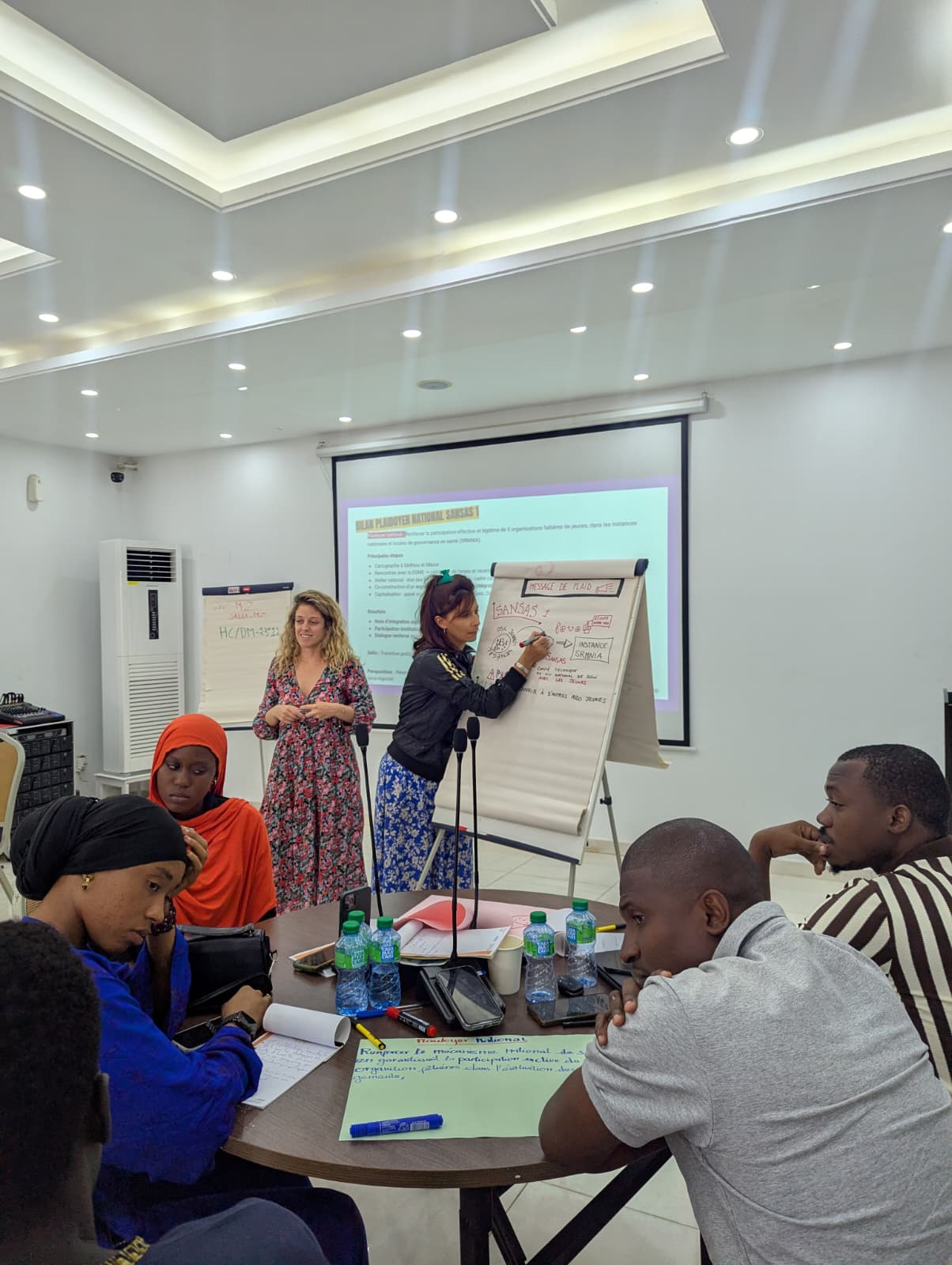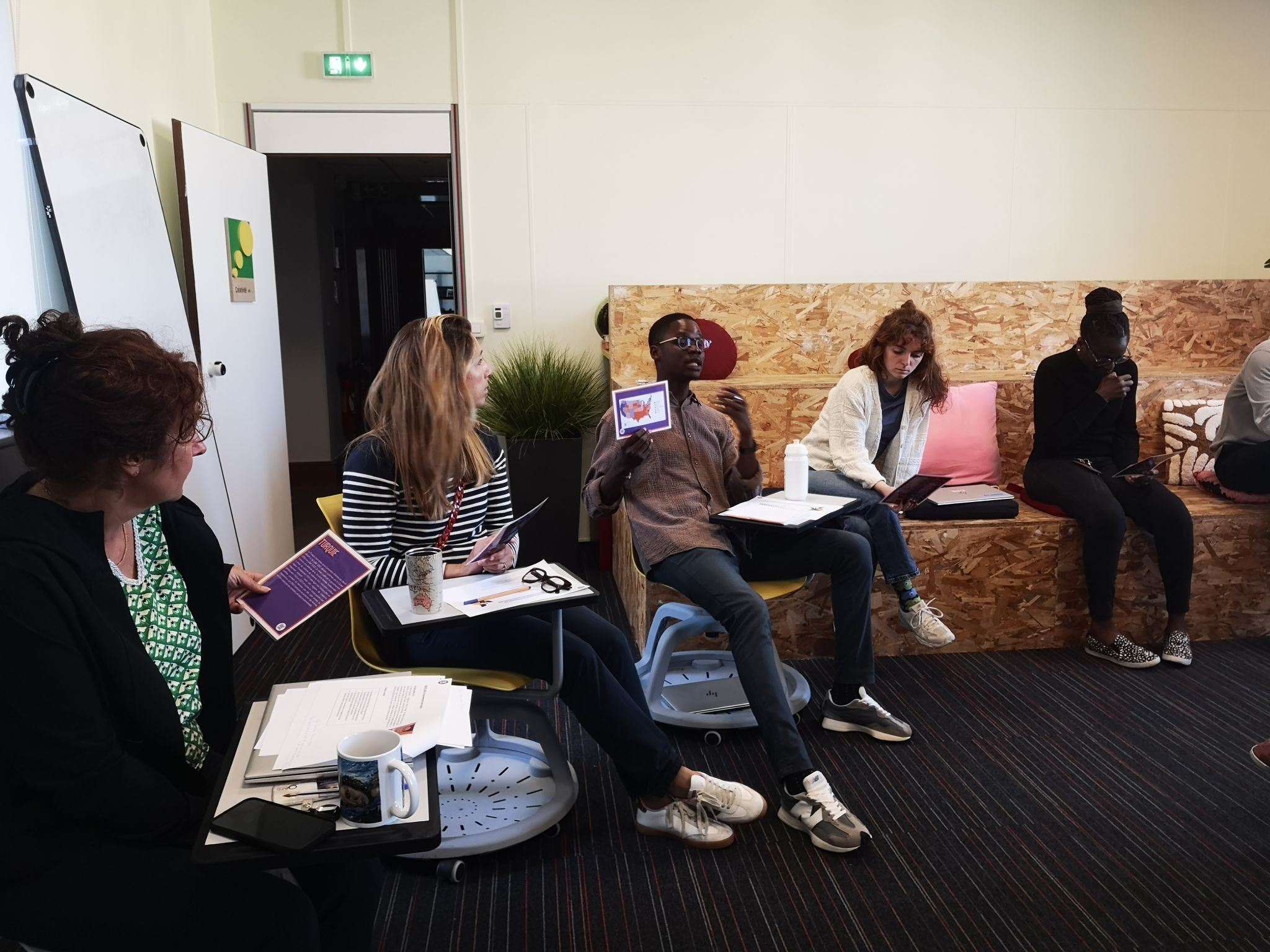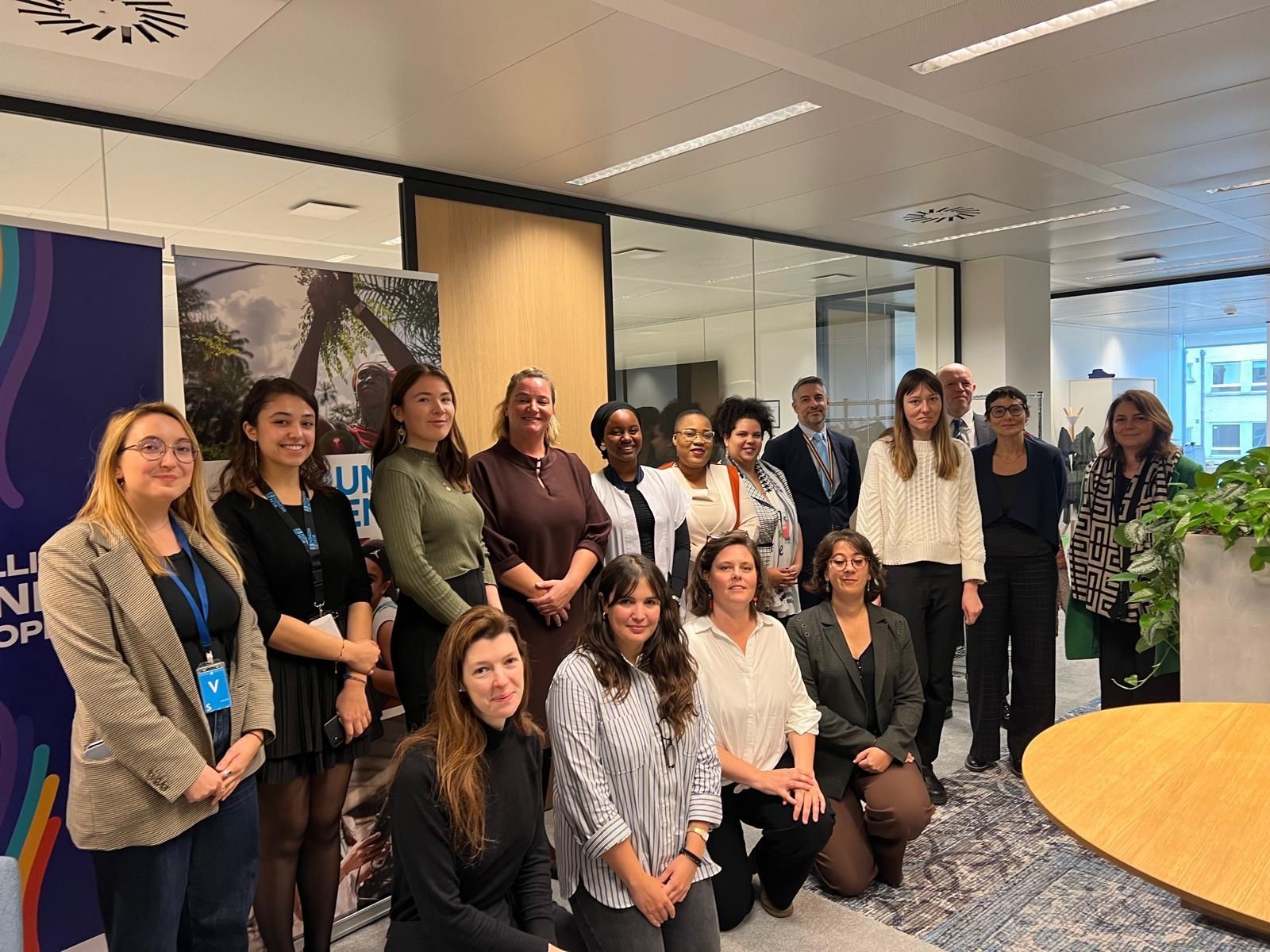Equipop took part in the 68th session of the UN Commission on the Status of Women, which took place from March 11 to 22, under the theme « accelerating the achievement of gender equality and the empowerment of all women and girls by addressing poverty and strengthening institutions and financing from a gender perspective ». The text adopted at the end of these two weeks is the result of negotiations during which the most conservative states attacked women’s rights and gender equality.
The international community is currently facing wars waged by men that primarily affect women, « wars against women’s rights »: with these grave words, Antonio Guterres opened the 68th session of the Commission on the Status of Women (CSW). The UN Secretary-General renewed his call for an immediate ceasefire in Gaza, as well as for the release of hostages and access to humanitarian aid. He also denounced the sexual violence committed against women and girls in times of conflict, drawing on the report by the UN Special Rapporteur on Violence against Women and Girls, which sheds light on sexual violence committed by Hamas as well as testimonies of violence against Palestinian women in the Occupied Territories. Other cases, such as those in Sudan or in the Democratic Republic of Congo, which are also the scene of sexual violence, were highlighted and denounced in various speeches at this CSW. The CSW68 concluded with the adoption of “agreed conclusions” where UN Member States renewed some of their commitments to gender equality. Negotiations were made difficult by the presence of anti-rights actors and the UN’s funding crisis, which greatly limited the space for discussion and prompted states to rush certain compromises, thus weakening the scope and content of the text. Some victories for gender equality and the protection of sexual and reproductive health and rights (SRHR) were nevertheless achieved. The CSW is a space where women’s rights are regularly instrumentalized to replay the power relations between states, against a backdrop of conflict, diplomatic competition and geopolitical disagreement. Therefore, it was vital for Equipop and its feminist allies to take part in the CSW so as to occupy the multilateral arena to counter anti-rights movements, besides providing technical support in these negotiations.
Achieving gender equality through feminist solidarities
This year, the CSW held special significance for the French delegation: it was an opportunity to celebrate the recent enshrinement of abortion in the French constitution, the outcome of the strong mobilization of French feminist associations. This mobilization had a large echo in Europe and in the rest of the world. In Poland, with the recent elections that removed the far right from power, feminists see an opportunity to make the same demand. Despite attacks on SRHR in Latin America, activists in the region confided that this victory offered some hope, as it proves that feminist activism works. This constitutionalization was made possible thanks to a close collaboration with French parliamentarians, who were represented by a particularly large delegation this year. Led by Guillaume Gouffier-Valente, Vice-Chairman of the French National Assembly’s Delegation for Women’s Rights, this cross-party delegation emphasized the importance of gender equality in French policies. Equipop had worked with them to strategically prepare for the CSW. While in New York, Equipop also facilitated a meeting with several partners from French-speaking West Africa to raise parliamentarians’ awareness of the region’s SRHR issues. This collaboration will continue in France, with the aim of developing feminist foreign policies.
Funding feminist movements in the face of backlash
The theme of this CSW focused on the root of the fight for gender equality, namely financing feminist movements. One watchword stood out in all the activists’ discussions: trust. They called on governments and private donors to step up their funding, but also to make it more flexible to facilitate access for smaller organizations. As the feminist network AWID pointed out at a parallel event, funding for anti-rights movements keeps growing, while funding for feminist associations remains very low. The Black Feminist Fund found that over 60% of black feminist groups have never received structural funding. Meanwhile, since 2019, the presence of far-right organizations in Africa has significantly increased. AWID explained that anti-right movements are also investing massively in the media on the continent. Equipop also took part in an event organized by the feminist fund AWDF, which focuses on financing feminist movements in French-speaking Africa. Lucie Daniel, Equipop’s Advocacy and Research Manager, presented the conclusions of the report co-authored in 2023 with the Jean-Jaurès Foundation: “Women’s rights: fighting the backlash”. Together with the ISDAO network, Equipop stressed the importance of creating links between feminist and LGBT networks. This mission to New York was also an opportunity for Equipop to exchange views with its partners on the « Walking the Talk« project, which is run by four European organizations (Equipop in France, Hivos in the Netherlands, the Center for Feminist Foreign Policy in Germany and Restless Development in the UK) and which aims at strengthening the framework and accountability of feminist foreign policies in Europe, in particular funding for feminist associations in the Global South.
Reclaiming space and strengthening international frameworks on issues related to SRHR and financing
Anti-rights movements were also present and very vocal at the CSW, whether at parallel events or during negotiations. This year, they went so far as to organize a counter-conference « on women and the family », further distorting the semantics and body of rights linked to family rights. The most conservative states tried to reduce the scope of the agreed conclusions by attacking the gender-related language in the text, even going so far as to challenge language that has been agreed for years, such as the terms « sexual and gender-based violence ». The protection of LGBTQIA+ rights, which are fundamental human rights, is not addressed in the text. Comprehensive sexuality education, although mentioned as important, is subject in its content to « cultural contexts » and « parental supervision ». Nevertheless, the most progressive voices obtained a few mentions of the need to protect SRHR. The text recognizes the need to integrate a gender perspective into the commitments made by States to finance development. In particular, it calls for « universal access » to SRHR, increasing investment in health services, including digital ones, and it recognizes “that the human rights of women include their right to have control over and decide freely and responsibly on all matters related to their sexuality, including sexual and reproductive health, free of coercion, discrimination and violence”. The final text also calls on governments and private donors to increase their support for civil society organizations in the form of sustainable, flexible, multi-year funding. Such wording is important for Equipop and its partners’ advocacy. Finally, the Commission on the Status of Women adopted a resolution on HIV/AIDS in parallel with the negotiations on the agreed conclusions, reiterating the importance of linking the fight against HIV/AIDS with the fight against gender inequality, and urging States to take joint action on both fronts, in line with the commitments made by the international community.
Mobilizing progressive States to make significant advances in gender equality
To counter conservative voices attacking the rights of women and LGBTQIA+ people, Equipop wrote an open letter which called on progressive Member States to join forces and mobilize during negotiations to reach agreed conclusions that protect these rights as far as possible.The organization also supported France in the run-up to the CSW and throughout the negotiations, by sharing analysis and amendments to the agreed conclusions consolidated through the Countdown 2030 Europe consortium, as well as during strategic exchanges with the Permanent Representation of the French Republic to the United Nations. Pursuing this dialogue is vital, with regards to France’s feminist foreign policy, and in the run-up to forthcoming international events such as the CPD57 and the Summit for the Future. France’s speeches at the CSW were marked by the promotion of this feminist foreign policy, which aims to protect SRHR on the international stage. To be credible, France must be consistent, and therefore ensure the effectiveness of SRHR on its territory as well: it must ensure effective access to all sexual and reproductive health care, including abortion which is now enshrined in its constitution, and secure funding to feminist associations, precisely the topic of the CSW discussions this year.
[vc_column width= »1/2″]In the upcoming weeks, Equipop will stay mobilized and will continue to challenge the government, at a time where major budget cuts have been announced by Minister Bruno Le Maire, which threaten funding for public policies on gender equality and feminist movements in France and abroad. We call on the French government and parliamentarians to do everything in their power to protect them.
[vc_column width= »1/2″]